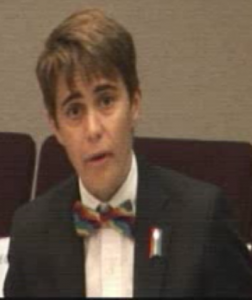Chicago removes ID requirement for transgender restroom users
By Kevin Beese For Chronicle Media — June 27, 2016
Ald. Deb Mell speaks at the June 22 Chicago City Council meeting about changing the law requiring transgendered people to use gender-specific public restrooms. (Photo courtesy Chicago City Council video)
Chicago has taken action to ensure bathroom and locker room access to transgender individuals.
As the city’s municipal code had been written, individuals were expected to use the restroom or other gender-specific facility that coincided with the sex listed on his or her government-issued identification. Now a person need only express his or her gender, if questioned.
Ald. Deb Mell (33rd Ward) said June being Gay Pride month is a time to reflect on the accomplishments in reaching equality for the lesbian, gay, bisexual and transgender community. She noted, however, that the mass murders in a gay Orlando nightclub show that the struggle is far from over.
“It wasn’t long ago that I stood on the floor of the Illinois General Assembly and pleaded with my colleagues to recognize that love is love and as American citizens I would be afforded the right to marry someone I love,” said the former state representative. “We won that battle and it wasn’t just because the LGBT community was organized or that we fought hard. It was because hearts and minds were changed. It was because Americans came to realize that they wanted a better life for their friends and family members who struggled to be accepted for so long.”
Mell said it was heartbreaking to hear parents testify before the city’s Human Relations Committee about their children who have never identified with the gender on their birth certificates but face questions, comments and confrontations when trying to use the restroom of the sex with which they identify.
The City Council last week passed eliminating the identification requirement for using public accommodations in a 45-5 vote. Aldermen voting against the measure were: Willie Cochran (20th Ward), David Moore (17th), Anthony Napolitano (41st), Nicholas Sposato (38th) and Patrick Thompson (11th).
At the Human Relations Committee hearing earlier this month, Napolitano expressed concerns about safety, with sexual predators possibly entering the bathroom of the opposite sex.
“No one wants to see discrimination against the LGBT community or any other community, but we are creating an ordinance based on the honor system,” he said. “Anyone can choose to go in whichever bathroom they want.”
Both he and Sposato also feared the “knucklehead effect” where a boy would go into women’s restroom or locker room, declare they are transgender that day, and that there would be no repercussions, under the law change.
Ald. Carlos Ramirez-Rosa (35th Ward) said not accepting people because of race of sexual preference has to be fought—with love. He mentioned the 23 of 49 murder victims in Orlando who were of Puerto Rican descent.
“We must do everything we can to legislate love and to reject hate,” Ramirez-Rosa said. “Make no mistake about it. The 49 in Orlando were murdered because of internalized homophobia and internalized hate in this society. When we legislate hate, we are paving the way for the hatred that drives that violence.
“… We can legislate love because we can show that as a city, we will not discriminate against our trans-sisters and brothers, that we will allow equality to reign supreme when it comes to access to public accommodations.”
Striking the identification requirement from the municipal code was introduced by Mayor Rahm Emanuel with Aldermen Ed Burke (14th Ward), James Cappleman (46th), Thomas Tunney (44th), Raymond Lopez (15th), Mell and Ramirez-Rosa.
Read the current issue of the Cook County Chronicle
Free digital subscription to the Cook County Chronicle
— Chicago removes ID requirement for transgender restroom users —







